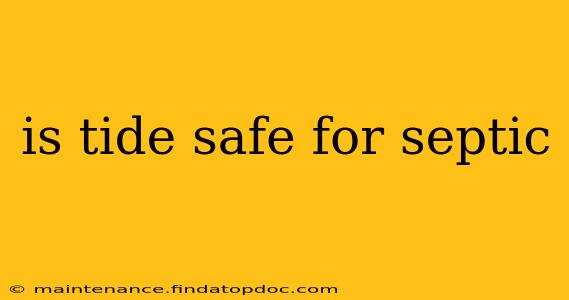Many homeowners with septic systems wonder about the safety of using popular laundry detergents like Tide. The short answer is: it depends. While Tide can be used in septic systems, certain formulations and usage habits can negatively impact your system's health. This comprehensive guide will delve into the specifics, answering your most pressing questions.
What Makes Tide (and Other Detergents) Potentially Harmful to Septic Systems?
The primary concern with using laundry detergents in septic systems is their high concentration of chemicals. Many detergents contain phosphates, enzymes, and other additives that can disrupt the delicate biological balance within the septic tank. This balance is crucial for the breakdown of organic waste. An imbalance can lead to:
- Slowed decomposition: Chemicals can interfere with the beneficial bacteria responsible for breaking down waste, leading to sludge buildup and potential backups.
- Increased sludge: Excess detergents can contribute to the formation of excessive sludge, reducing the tank's effective capacity.
- Harmful algal blooms: Phosphates (though less common in modern formulations) can fuel the growth of algae, particularly in drain fields. This can clog drain lines and lead to system failure.
Is Tide Pods Safe for Septic Systems?
Tide Pods, and other similar pod-based detergents, present a unique challenge. While the detergent itself might not be inherently worse for your septic system than liquid or powder forms, the plastic packaging is a concern. The pods do not dissolve readily in water and can potentially clog your system if they aren't fully breaking down. Therefore, while not inherently "unsafe," it's best to exercise caution and use them sparingly.
What About Tide Free & Gentle or Other Low-Suds Detergents?
Low-sudsing detergents are generally considered safer for septic systems than high-sudsing varieties. Tide Free & Gentle, and similar low-sudsing, low-phosphate options often pose less risk of disrupting the septic tank's bacterial balance. However, even these should be used in moderation.
How Can I Minimize the Impact of Laundry Detergent on My Septic System?
Regardless of the detergent you choose, you can minimize its impact on your septic system by following these guidelines:
- Use less detergent: Always adhere to the manufacturer's recommended dosage. Using less detergent is often sufficient for clean laundry.
- Choose septic-safe detergents: Many detergents are specifically formulated for use with septic systems. Look for labels indicating their suitability.
- Regular maintenance: Regular pumping and inspection of your septic system are crucial to ensure its proper functioning, regardless of the detergent used.
- Avoid excessive use of bleach: Bleach can kill the beneficial bacteria in your septic tank, hindering waste breakdown.
- Proper distribution of laundry: Don't overload your washing machine.
Does Tide Cause Septic Tank Problems?
Tide, like other detergents, can contribute to septic tank problems if used improperly or excessively. It’s not the detergent itself that causes problems, but rather the potential disruption of the natural bacterial processes within the tank caused by high concentrations of chemicals. Therefore, moderation and smart choices are key.
What Kind of Laundry Detergent is Best for a Septic System?
The best laundry detergent for a septic system is one that's specifically formulated to be septic-safe. These detergents are often low-sudsing and phosphate-free, minimizing their potential impact on the beneficial bacteria within the tank. Always check the product label for explicit claims of septic safety.
Can I Use Any Detergent in My Septic System?
While you can technically use most detergents in your septic system, it's not recommended to rely on high-sudsing, high-phosphate options. These have the highest potential to disrupt your septic system's delicate biological processes. Always err on the side of caution and consider choosing a septic-safe alternative whenever possible.
By following these guidelines and choosing appropriate detergents, you can minimize the potential impact on your septic system and ensure its longevity. Regular maintenance remains crucial regardless of your detergent choices.
